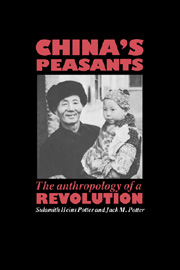Book contents
- Frontmatter
- Contents
- List of illustrations
- List of tables
- Preface
- Notes on the text
- Map 1 China
- 1 The old “feudal” order: Zengbu before Liberation
- 2 Establishing the new order
- 3 The ordeal of collectivization
- 4 The Cultural Revolution
- 5 Maoist society: the production team
- 6 Maoist society: the brigade
- 7 Maoist society: the commune
- 8 Impatient aspirations: transition to the post-Mao period
- 9 The cultural construction of emotion in rural Chinese social life
- 10 Marriage, household, and family form
- 11 Chinese birth planning: a cultural account
- 12 Lineage and collective: structure and praxis
- 13 Party organization
- 14 The party ethic: a devotion born of distress and enthusiasm
- 15 A caste-like system of social stratification: the position of peasants in modern China's social order
- 16 The Chinese peasants and the world capitalist system
- 17 The crystallization of post-Mao society: Zengbu in 1985
- References
- Index
8 - Impatient aspirations: transition to the post-Mao period
Published online by Cambridge University Press: 02 December 2009
- Frontmatter
- Contents
- List of illustrations
- List of tables
- Preface
- Notes on the text
- Map 1 China
- 1 The old “feudal” order: Zengbu before Liberation
- 2 Establishing the new order
- 3 The ordeal of collectivization
- 4 The Cultural Revolution
- 5 Maoist society: the production team
- 6 Maoist society: the brigade
- 7 Maoist society: the commune
- 8 Impatient aspirations: transition to the post-Mao period
- 9 The cultural construction of emotion in rural Chinese social life
- 10 Marriage, household, and family form
- 11 Chinese birth planning: a cultural account
- 12 Lineage and collective: structure and praxis
- 13 Party organization
- 14 The party ethic: a devotion born of distress and enthusiasm
- 15 A caste-like system of social stratification: the position of peasants in modern China's social order
- 16 The Chinese peasants and the world capitalist system
- 17 The crystallization of post-Mao society: Zengbu in 1985
- References
- Index
Summary
The decollectivization of rural China took place over five years (1978–83), during which the work of three decades of revolutionary Maoism was undone, and a new, non-Maoist manner of rural development was substituted. The change had its roots in longstanding intraparty disagreement and struggle over China's rural development policy. The party had historically included advocates of two different roads to rural development, the collectivists, or “socialist roaders,” led by Chairman Mao, and an opposing group represented by Liu Shaoqi and Deng Xiaoping. The party was trying to achieve two goals simultaneously: rural prosperity, on the one hand, and revolutionary reform and social equality, on the other. The Maoists wanted both, but they were willing to sacrifice immediate prosperity to achieve more radical and fundamental social transformations; the Liuists de-emphasized revolutionary change and were willing to sacrifice completeness of social reform to immediate prosperity. The Liuists were willing to go with the grain of peasant familism and conservatism; the Maoists wanted to change these once and for all.
From the Maoist point of view, a permanent and radical revolutionary modification of China's familistic peasant society and culture was necessary. This was to be achieved through collective forms of social organization. The collectives were characterized by a constructed moral economy, a moral economy imposed deliberately from above, where none had been indigenously present. Without the collectives, an amoral competitive familism would lead to the re-emergence of socioeconomic stratification among peasants.
- Type
- Chapter
- Information
- China's PeasantsThe Anthropology of a Revolution, pp. 158 - 179Publisher: Cambridge University PressPrint publication year: 1990



